Report: Personal and Professional Development for National Trust
VerifiedAdded on 2021/02/19
|18
|6044
|316
Report
AI Summary
This report provides a comprehensive overview of personal and professional development, focusing on self-managed learning approaches, lifelong learning strategies, and the benefits for both managers and the National Trust. It evaluates various methods, including visionary approaches, research-based learning, and learning from others through conferences and mentoring. The report also proposes ways to encourage lifelong learning and defines the responsibilities involved in managing and organizing activities. Furthermore, it examines convergent, lateral, and critical thinking skills and assesses current skills and competencies against professional standards. The assignment culminates in the creation of a personal and professional development plan, including the processes and activities required for implementation, critical reflection, and plan updates based on feedback. Overall, the report aims to enhance skills like time management and confidence, and to help employees achieve organizational goals, highlighting the importance of continuous improvement and adaptation in the workplace.
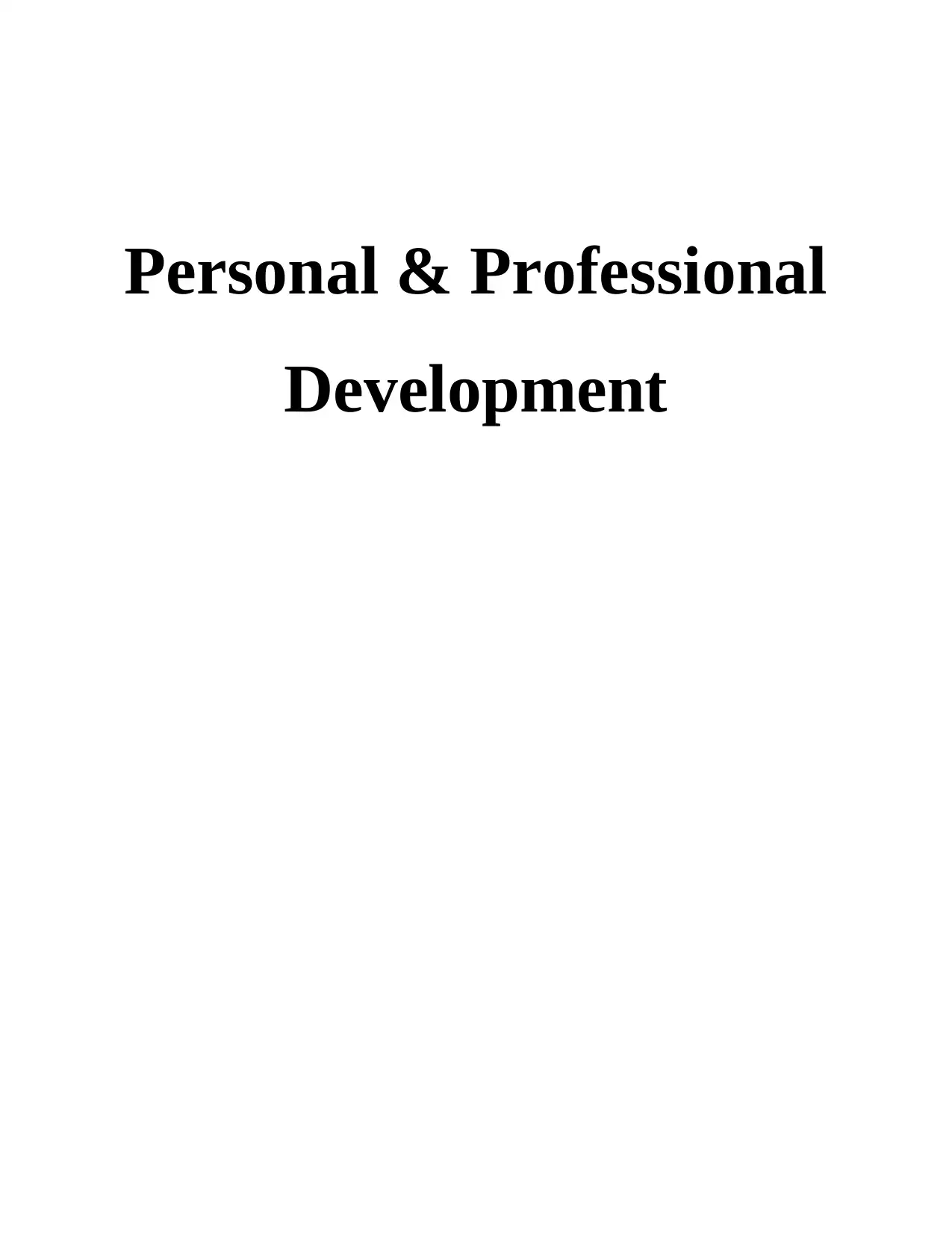
Personal & Professional
Development
Development
Paraphrase This Document
Need a fresh take? Get an instant paraphrase of this document with our AI Paraphraser
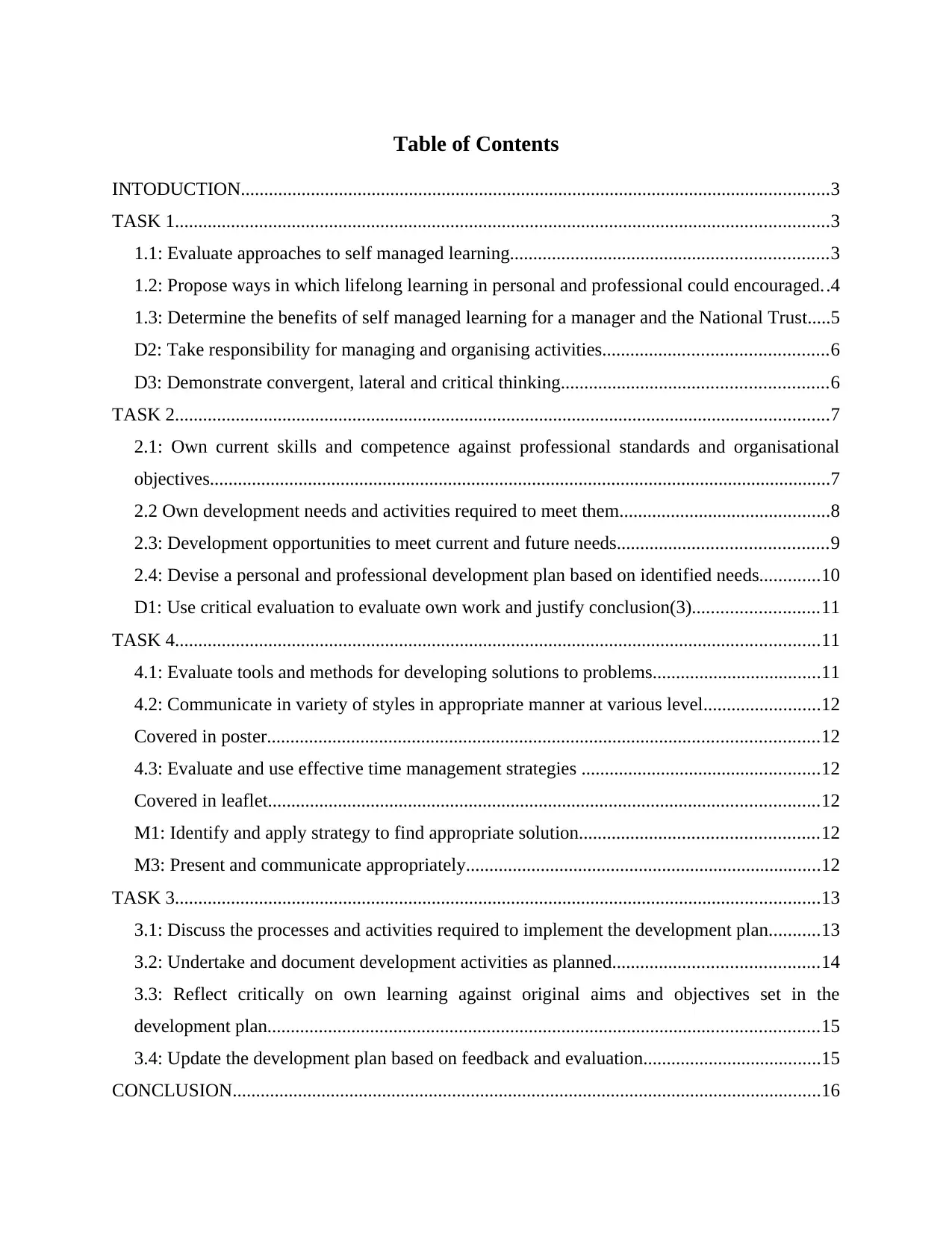
Table of Contents
INTODUCTION..............................................................................................................................3
TASK 1............................................................................................................................................3
1.1: Evaluate approaches to self managed learning....................................................................3
1.2: Propose ways in which lifelong learning in personal and professional could encouraged..4
1.3: Determine the benefits of self managed learning for a manager and the National Trust.....5
D2: Take responsibility for managing and organising activities................................................6
D3: Demonstrate convergent, lateral and critical thinking.........................................................6
TASK 2............................................................................................................................................7
2.1: Own current skills and competence against professional standards and organisational
objectives.....................................................................................................................................7
2.2 Own development needs and activities required to meet them.............................................8
2.3: Development opportunities to meet current and future needs.............................................9
2.4: Devise a personal and professional development plan based on identified needs.............10
D1: Use critical evaluation to evaluate own work and justify conclusion(3)...........................11
TASK 4..........................................................................................................................................11
4.1: Evaluate tools and methods for developing solutions to problems....................................11
4.2: Communicate in variety of styles in appropriate manner at various level.........................12
Covered in poster......................................................................................................................12
4.3: Evaluate and use effective time management strategies ...................................................12
Covered in leaflet......................................................................................................................12
M1: Identify and apply strategy to find appropriate solution...................................................12
M3: Present and communicate appropriately............................................................................12
TASK 3..........................................................................................................................................13
3.1: Discuss the processes and activities required to implement the development plan...........13
3.2: Undertake and document development activities as planned............................................14
3.3: Reflect critically on own learning against original aims and objectives set in the
development plan......................................................................................................................15
3.4: Update the development plan based on feedback and evaluation......................................15
CONCLUSION..............................................................................................................................16
INTODUCTION..............................................................................................................................3
TASK 1............................................................................................................................................3
1.1: Evaluate approaches to self managed learning....................................................................3
1.2: Propose ways in which lifelong learning in personal and professional could encouraged..4
1.3: Determine the benefits of self managed learning for a manager and the National Trust.....5
D2: Take responsibility for managing and organising activities................................................6
D3: Demonstrate convergent, lateral and critical thinking.........................................................6
TASK 2............................................................................................................................................7
2.1: Own current skills and competence against professional standards and organisational
objectives.....................................................................................................................................7
2.2 Own development needs and activities required to meet them.............................................8
2.3: Development opportunities to meet current and future needs.............................................9
2.4: Devise a personal and professional development plan based on identified needs.............10
D1: Use critical evaluation to evaluate own work and justify conclusion(3)...........................11
TASK 4..........................................................................................................................................11
4.1: Evaluate tools and methods for developing solutions to problems....................................11
4.2: Communicate in variety of styles in appropriate manner at various level.........................12
Covered in poster......................................................................................................................12
4.3: Evaluate and use effective time management strategies ...................................................12
Covered in leaflet......................................................................................................................12
M1: Identify and apply strategy to find appropriate solution...................................................12
M3: Present and communicate appropriately............................................................................12
TASK 3..........................................................................................................................................13
3.1: Discuss the processes and activities required to implement the development plan...........13
3.2: Undertake and document development activities as planned............................................14
3.3: Reflect critically on own learning against original aims and objectives set in the
development plan......................................................................................................................15
3.4: Update the development plan based on feedback and evaluation......................................15
CONCLUSION..............................................................................................................................16

REFERENCES .............................................................................................................................18
⊘ This is a preview!⊘
Do you want full access?
Subscribe today to unlock all pages.

Trusted by 1+ million students worldwide
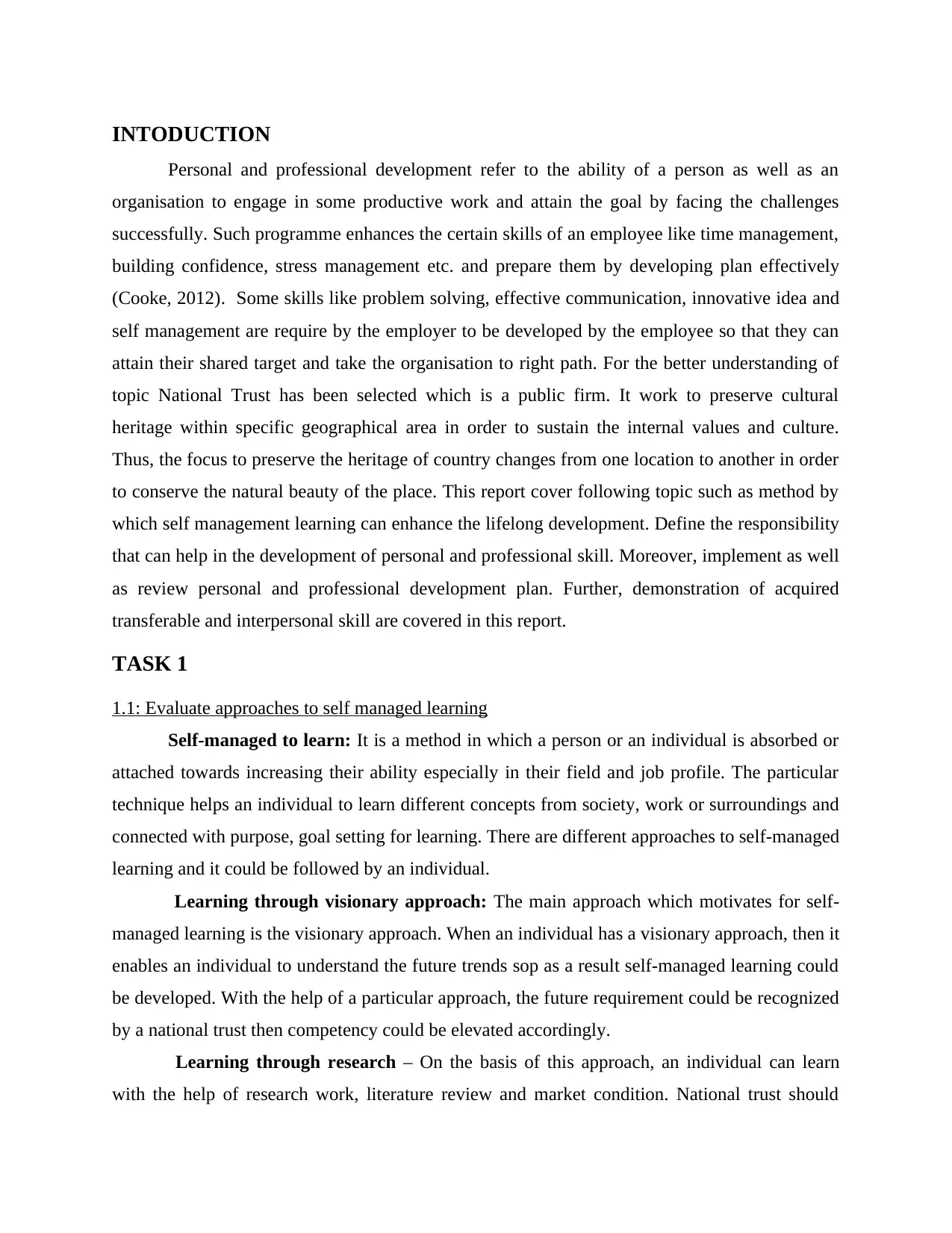
INTODUCTION
Personal and professional development refer to the ability of a person as well as an
organisation to engage in some productive work and attain the goal by facing the challenges
successfully. Such programme enhances the certain skills of an employee like time management,
building confidence, stress management etc. and prepare them by developing plan effectively
(Cooke, 2012). Some skills like problem solving, effective communication, innovative idea and
self management are require by the employer to be developed by the employee so that they can
attain their shared target and take the organisation to right path. For the better understanding of
topic National Trust has been selected which is a public firm. It work to preserve cultural
heritage within specific geographical area in order to sustain the internal values and culture.
Thus, the focus to preserve the heritage of country changes from one location to another in order
to conserve the natural beauty of the place. This report cover following topic such as method by
which self management learning can enhance the lifelong development. Define the responsibility
that can help in the development of personal and professional skill. Moreover, implement as well
as review personal and professional development plan. Further, demonstration of acquired
transferable and interpersonal skill are covered in this report.
TASK 1
1.1: Evaluate approaches to self managed learning
Self-managed to learn: It is a method in which a person or an individual is absorbed or
attached towards increasing their ability especially in their field and job profile. The particular
technique helps an individual to learn different concepts from society, work or surroundings and
connected with purpose, goal setting for learning. There are different approaches to self-managed
learning and it could be followed by an individual.
Learning through visionary approach: The main approach which motivates for self-
managed learning is the visionary approach. When an individual has a visionary approach, then it
enables an individual to understand the future trends sop as a result self-managed learning could
be developed. With the help of a particular approach, the future requirement could be recognized
by a national trust then competency could be elevated accordingly.
Learning through research – On the basis of this approach, an individual can learn
with the help of research work, literature review and market condition. National trust should
Personal and professional development refer to the ability of a person as well as an
organisation to engage in some productive work and attain the goal by facing the challenges
successfully. Such programme enhances the certain skills of an employee like time management,
building confidence, stress management etc. and prepare them by developing plan effectively
(Cooke, 2012). Some skills like problem solving, effective communication, innovative idea and
self management are require by the employer to be developed by the employee so that they can
attain their shared target and take the organisation to right path. For the better understanding of
topic National Trust has been selected which is a public firm. It work to preserve cultural
heritage within specific geographical area in order to sustain the internal values and culture.
Thus, the focus to preserve the heritage of country changes from one location to another in order
to conserve the natural beauty of the place. This report cover following topic such as method by
which self management learning can enhance the lifelong development. Define the responsibility
that can help in the development of personal and professional skill. Moreover, implement as well
as review personal and professional development plan. Further, demonstration of acquired
transferable and interpersonal skill are covered in this report.
TASK 1
1.1: Evaluate approaches to self managed learning
Self-managed to learn: It is a method in which a person or an individual is absorbed or
attached towards increasing their ability especially in their field and job profile. The particular
technique helps an individual to learn different concepts from society, work or surroundings and
connected with purpose, goal setting for learning. There are different approaches to self-managed
learning and it could be followed by an individual.
Learning through visionary approach: The main approach which motivates for self-
managed learning is the visionary approach. When an individual has a visionary approach, then it
enables an individual to understand the future trends sop as a result self-managed learning could
be developed. With the help of a particular approach, the future requirement could be recognized
by a national trust then competency could be elevated accordingly.
Learning through research – On the basis of this approach, an individual can learn
with the help of research work, literature review and market condition. National trust should
Paraphrase This Document
Need a fresh take? Get an instant paraphrase of this document with our AI Paraphraser
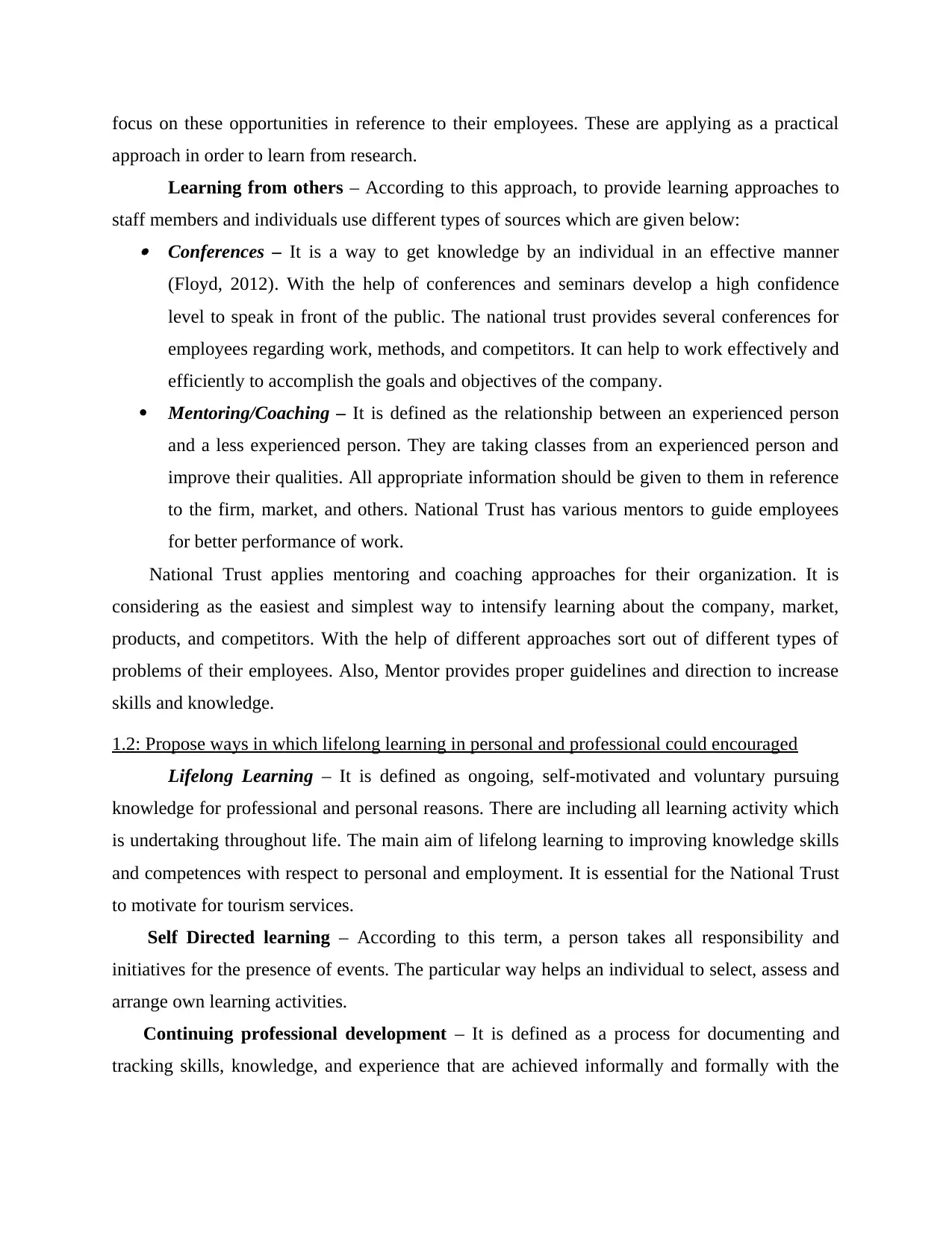
focus on these opportunities in reference to their employees. These are applying as a practical
approach in order to learn from research.
Learning from others – According to this approach, to provide learning approaches to
staff members and individuals use different types of sources which are given below: Conferences – It is a way to get knowledge by an individual in an effective manner
(Floyd, 2012). With the help of conferences and seminars develop a high confidence
level to speak in front of the public. The national trust provides several conferences for
employees regarding work, methods, and competitors. It can help to work effectively and
efficiently to accomplish the goals and objectives of the company.
Mentoring/Coaching – It is defined as the relationship between an experienced person
and a less experienced person. They are taking classes from an experienced person and
improve their qualities. All appropriate information should be given to them in reference
to the firm, market, and others. National Trust has various mentors to guide employees
for better performance of work.
National Trust applies mentoring and coaching approaches for their organization. It is
considering as the easiest and simplest way to intensify learning about the company, market,
products, and competitors. With the help of different approaches sort out of different types of
problems of their employees. Also, Mentor provides proper guidelines and direction to increase
skills and knowledge.
1.2: Propose ways in which lifelong learning in personal and professional could encouraged
Lifelong Learning – It is defined as ongoing, self-motivated and voluntary pursuing
knowledge for professional and personal reasons. There are including all learning activity which
is undertaking throughout life. The main aim of lifelong learning to improving knowledge skills
and competences with respect to personal and employment. It is essential for the National Trust
to motivate for tourism services.
Self Directed learning – According to this term, a person takes all responsibility and
initiatives for the presence of events. The particular way helps an individual to select, assess and
arrange own learning activities.
Continuing professional development – It is defined as a process for documenting and
tracking skills, knowledge, and experience that are achieved informally and formally with the
approach in order to learn from research.
Learning from others – According to this approach, to provide learning approaches to
staff members and individuals use different types of sources which are given below: Conferences – It is a way to get knowledge by an individual in an effective manner
(Floyd, 2012). With the help of conferences and seminars develop a high confidence
level to speak in front of the public. The national trust provides several conferences for
employees regarding work, methods, and competitors. It can help to work effectively and
efficiently to accomplish the goals and objectives of the company.
Mentoring/Coaching – It is defined as the relationship between an experienced person
and a less experienced person. They are taking classes from an experienced person and
improve their qualities. All appropriate information should be given to them in reference
to the firm, market, and others. National Trust has various mentors to guide employees
for better performance of work.
National Trust applies mentoring and coaching approaches for their organization. It is
considering as the easiest and simplest way to intensify learning about the company, market,
products, and competitors. With the help of different approaches sort out of different types of
problems of their employees. Also, Mentor provides proper guidelines and direction to increase
skills and knowledge.
1.2: Propose ways in which lifelong learning in personal and professional could encouraged
Lifelong Learning – It is defined as ongoing, self-motivated and voluntary pursuing
knowledge for professional and personal reasons. There are including all learning activity which
is undertaking throughout life. The main aim of lifelong learning to improving knowledge skills
and competences with respect to personal and employment. It is essential for the National Trust
to motivate for tourism services.
Self Directed learning – According to this term, a person takes all responsibility and
initiatives for the presence of events. The particular way helps an individual to select, assess and
arrange own learning activities.
Continuing professional development – It is defined as a process for documenting and
tracking skills, knowledge, and experience that are achieved informally and formally with the
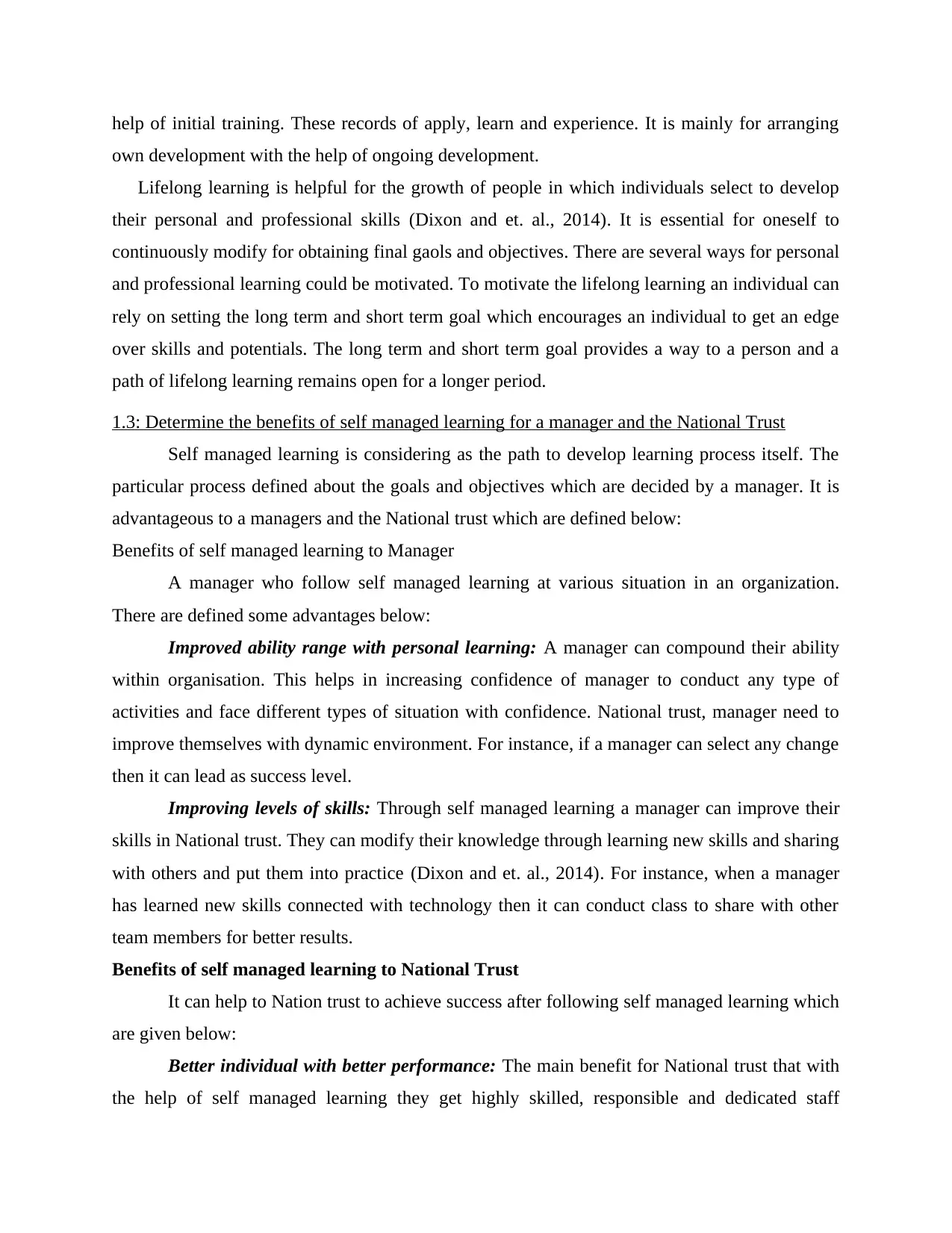
help of initial training. These records of apply, learn and experience. It is mainly for arranging
own development with the help of ongoing development.
Lifelong learning is helpful for the growth of people in which individuals select to develop
their personal and professional skills (Dixon and et. al., 2014). It is essential for oneself to
continuously modify for obtaining final gaols and objectives. There are several ways for personal
and professional learning could be motivated. To motivate the lifelong learning an individual can
rely on setting the long term and short term goal which encourages an individual to get an edge
over skills and potentials. The long term and short term goal provides a way to a person and a
path of lifelong learning remains open for a longer period.
1.3: Determine the benefits of self managed learning for a manager and the National Trust
Self managed learning is considering as the path to develop learning process itself. The
particular process defined about the goals and objectives which are decided by a manager. It is
advantageous to a managers and the National trust which are defined below:
Benefits of self managed learning to Manager
A manager who follow self managed learning at various situation in an organization.
There are defined some advantages below:
Improved ability range with personal learning: A manager can compound their ability
within organisation. This helps in increasing confidence of manager to conduct any type of
activities and face different types of situation with confidence. National trust, manager need to
improve themselves with dynamic environment. For instance, if a manager can select any change
then it can lead as success level.
Improving levels of skills: Through self managed learning a manager can improve their
skills in National trust. They can modify their knowledge through learning new skills and sharing
with others and put them into practice (Dixon and et. al., 2014). For instance, when a manager
has learned new skills connected with technology then it can conduct class to share with other
team members for better results.
Benefits of self managed learning to National Trust
It can help to Nation trust to achieve success after following self managed learning which
are given below:
Better individual with better performance: The main benefit for National trust that with
the help of self managed learning they get highly skilled, responsible and dedicated staff
own development with the help of ongoing development.
Lifelong learning is helpful for the growth of people in which individuals select to develop
their personal and professional skills (Dixon and et. al., 2014). It is essential for oneself to
continuously modify for obtaining final gaols and objectives. There are several ways for personal
and professional learning could be motivated. To motivate the lifelong learning an individual can
rely on setting the long term and short term goal which encourages an individual to get an edge
over skills and potentials. The long term and short term goal provides a way to a person and a
path of lifelong learning remains open for a longer period.
1.3: Determine the benefits of self managed learning for a manager and the National Trust
Self managed learning is considering as the path to develop learning process itself. The
particular process defined about the goals and objectives which are decided by a manager. It is
advantageous to a managers and the National trust which are defined below:
Benefits of self managed learning to Manager
A manager who follow self managed learning at various situation in an organization.
There are defined some advantages below:
Improved ability range with personal learning: A manager can compound their ability
within organisation. This helps in increasing confidence of manager to conduct any type of
activities and face different types of situation with confidence. National trust, manager need to
improve themselves with dynamic environment. For instance, if a manager can select any change
then it can lead as success level.
Improving levels of skills: Through self managed learning a manager can improve their
skills in National trust. They can modify their knowledge through learning new skills and sharing
with others and put them into practice (Dixon and et. al., 2014). For instance, when a manager
has learned new skills connected with technology then it can conduct class to share with other
team members for better results.
Benefits of self managed learning to National Trust
It can help to Nation trust to achieve success after following self managed learning which
are given below:
Better individual with better performance: The main benefit for National trust that with
the help of self managed learning they get highly skilled, responsible and dedicated staff
⊘ This is a preview!⊘
Do you want full access?
Subscribe today to unlock all pages.

Trusted by 1+ million students worldwide
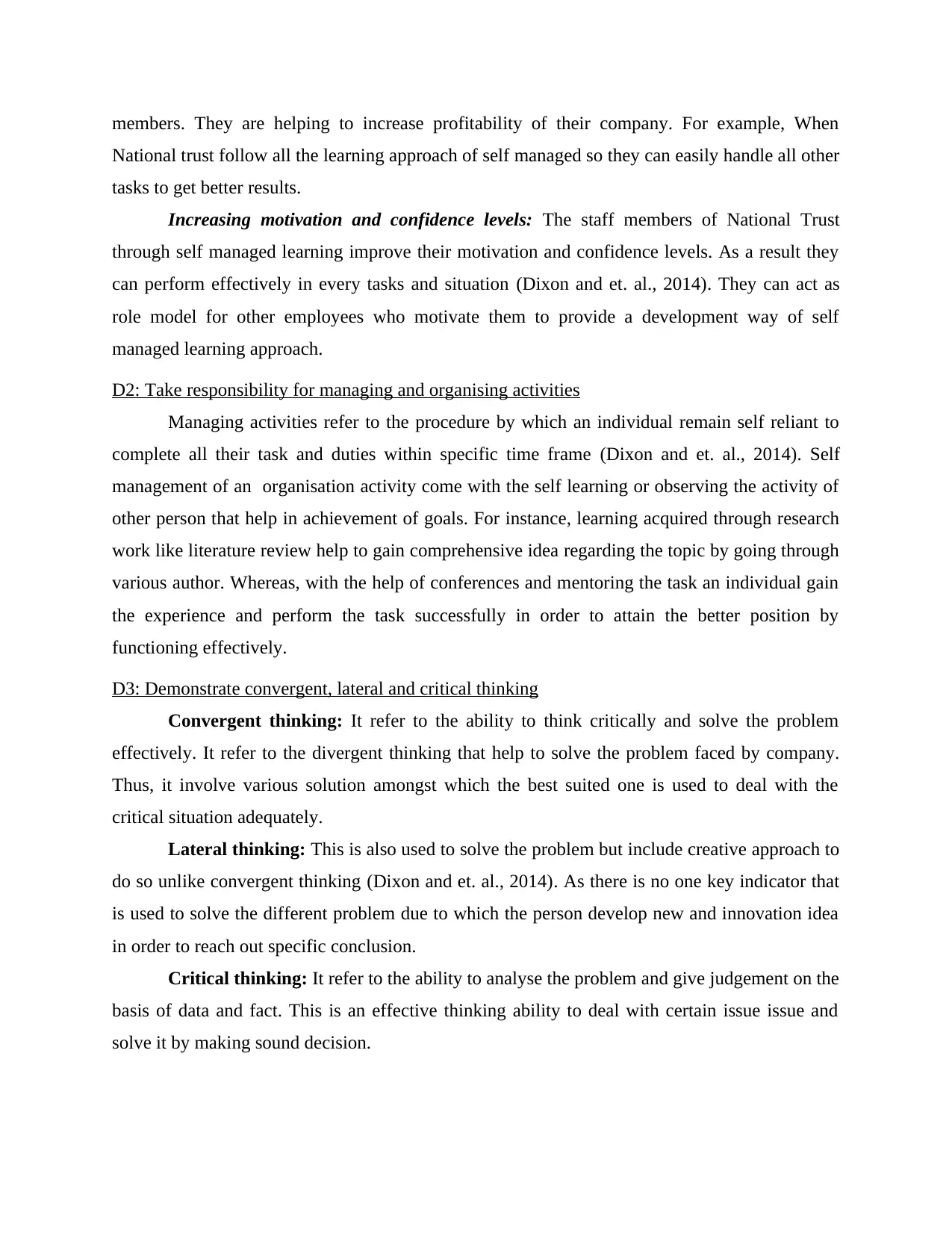
members. They are helping to increase profitability of their company. For example, When
National trust follow all the learning approach of self managed so they can easily handle all other
tasks to get better results.
Increasing motivation and confidence levels: The staff members of National Trust
through self managed learning improve their motivation and confidence levels. As a result they
can perform effectively in every tasks and situation (Dixon and et. al., 2014). They can act as
role model for other employees who motivate them to provide a development way of self
managed learning approach.
D2: Take responsibility for managing and organising activities
Managing activities refer to the procedure by which an individual remain self reliant to
complete all their task and duties within specific time frame (Dixon and et. al., 2014). Self
management of an organisation activity come with the self learning or observing the activity of
other person that help in achievement of goals. For instance, learning acquired through research
work like literature review help to gain comprehensive idea regarding the topic by going through
various author. Whereas, with the help of conferences and mentoring the task an individual gain
the experience and perform the task successfully in order to attain the better position by
functioning effectively.
D3: Demonstrate convergent, lateral and critical thinking
Convergent thinking: It refer to the ability to think critically and solve the problem
effectively. It refer to the divergent thinking that help to solve the problem faced by company.
Thus, it involve various solution amongst which the best suited one is used to deal with the
critical situation adequately.
Lateral thinking: This is also used to solve the problem but include creative approach to
do so unlike convergent thinking (Dixon and et. al., 2014). As there is no one key indicator that
is used to solve the different problem due to which the person develop new and innovation idea
in order to reach out specific conclusion.
Critical thinking: It refer to the ability to analyse the problem and give judgement on the
basis of data and fact. This is an effective thinking ability to deal with certain issue issue and
solve it by making sound decision.
National trust follow all the learning approach of self managed so they can easily handle all other
tasks to get better results.
Increasing motivation and confidence levels: The staff members of National Trust
through self managed learning improve their motivation and confidence levels. As a result they
can perform effectively in every tasks and situation (Dixon and et. al., 2014). They can act as
role model for other employees who motivate them to provide a development way of self
managed learning approach.
D2: Take responsibility for managing and organising activities
Managing activities refer to the procedure by which an individual remain self reliant to
complete all their task and duties within specific time frame (Dixon and et. al., 2014). Self
management of an organisation activity come with the self learning or observing the activity of
other person that help in achievement of goals. For instance, learning acquired through research
work like literature review help to gain comprehensive idea regarding the topic by going through
various author. Whereas, with the help of conferences and mentoring the task an individual gain
the experience and perform the task successfully in order to attain the better position by
functioning effectively.
D3: Demonstrate convergent, lateral and critical thinking
Convergent thinking: It refer to the ability to think critically and solve the problem
effectively. It refer to the divergent thinking that help to solve the problem faced by company.
Thus, it involve various solution amongst which the best suited one is used to deal with the
critical situation adequately.
Lateral thinking: This is also used to solve the problem but include creative approach to
do so unlike convergent thinking (Dixon and et. al., 2014). As there is no one key indicator that
is used to solve the different problem due to which the person develop new and innovation idea
in order to reach out specific conclusion.
Critical thinking: It refer to the ability to analyse the problem and give judgement on the
basis of data and fact. This is an effective thinking ability to deal with certain issue issue and
solve it by making sound decision.
Paraphrase This Document
Need a fresh take? Get an instant paraphrase of this document with our AI Paraphraser
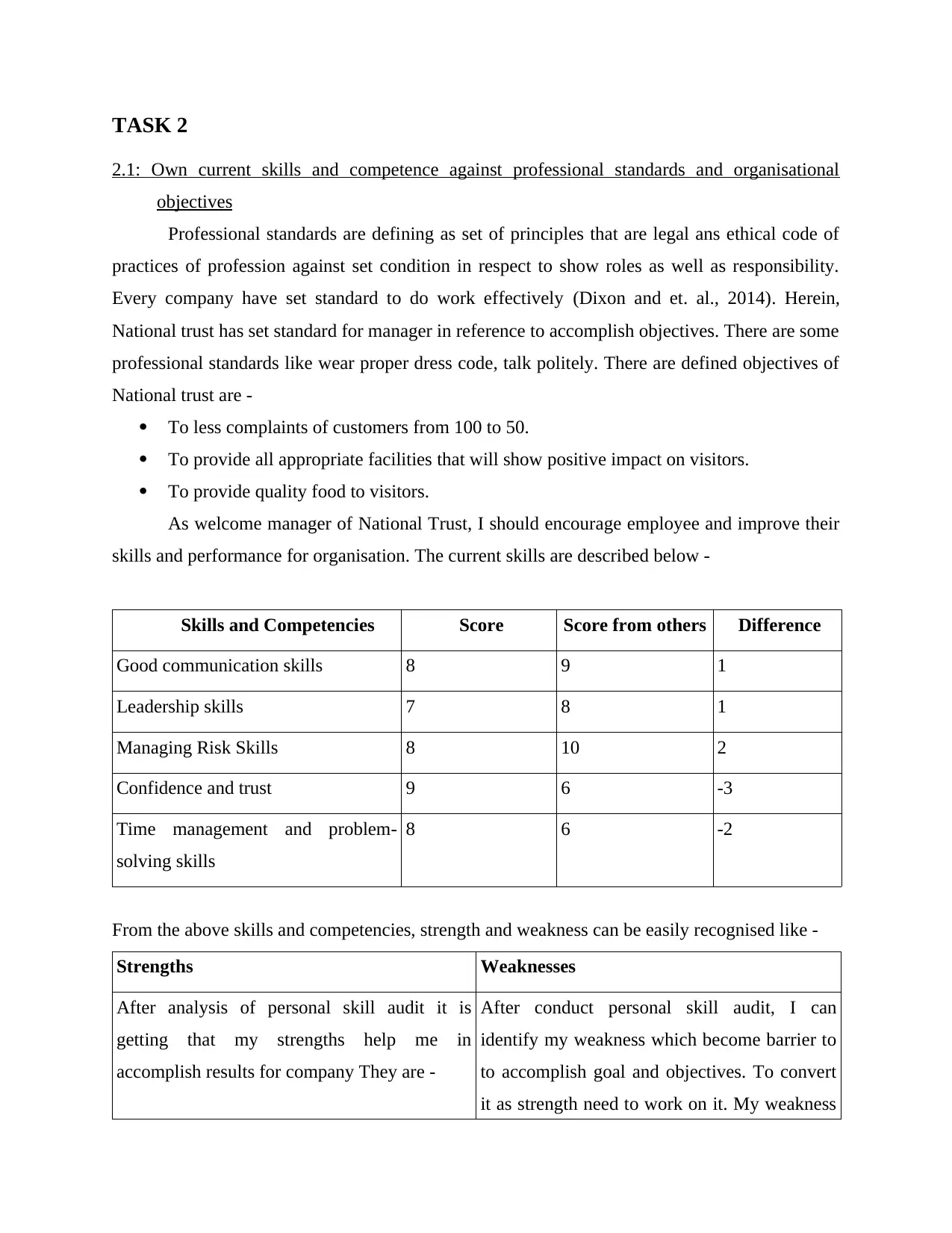
TASK 2
2.1: Own current skills and competence against professional standards and organisational
objectives
Professional standards are defining as set of principles that are legal ans ethical code of
practices of profession against set condition in respect to show roles as well as responsibility.
Every company have set standard to do work effectively (Dixon and et. al., 2014). Herein,
National trust has set standard for manager in reference to accomplish objectives. There are some
professional standards like wear proper dress code, talk politely. There are defined objectives of
National trust are -
To less complaints of customers from 100 to 50.
To provide all appropriate facilities that will show positive impact on visitors.
To provide quality food to visitors.
As welcome manager of National Trust, I should encourage employee and improve their
skills and performance for organisation. The current skills are described below -
Skills and Competencies Score Score from others Difference
Good communication skills 8 9 1
Leadership skills 7 8 1
Managing Risk Skills 8 10 2
Confidence and trust 9 6 -3
Time management and problem-
solving skills
8 6 -2
From the above skills and competencies, strength and weakness can be easily recognised like -
Strengths Weaknesses
After analysis of personal skill audit it is
getting that my strengths help me in
accomplish results for company They are -
After conduct personal skill audit, I can
identify my weakness which become barrier to
to accomplish goal and objectives. To convert
it as strength need to work on it. My weakness
2.1: Own current skills and competence against professional standards and organisational
objectives
Professional standards are defining as set of principles that are legal ans ethical code of
practices of profession against set condition in respect to show roles as well as responsibility.
Every company have set standard to do work effectively (Dixon and et. al., 2014). Herein,
National trust has set standard for manager in reference to accomplish objectives. There are some
professional standards like wear proper dress code, talk politely. There are defined objectives of
National trust are -
To less complaints of customers from 100 to 50.
To provide all appropriate facilities that will show positive impact on visitors.
To provide quality food to visitors.
As welcome manager of National Trust, I should encourage employee and improve their
skills and performance for organisation. The current skills are described below -
Skills and Competencies Score Score from others Difference
Good communication skills 8 9 1
Leadership skills 7 8 1
Managing Risk Skills 8 10 2
Confidence and trust 9 6 -3
Time management and problem-
solving skills
8 6 -2
From the above skills and competencies, strength and weakness can be easily recognised like -
Strengths Weaknesses
After analysis of personal skill audit it is
getting that my strengths help me in
accomplish results for company They are -
After conduct personal skill audit, I can
identify my weakness which become barrier to
to accomplish goal and objectives. To convert
it as strength need to work on it. My weakness
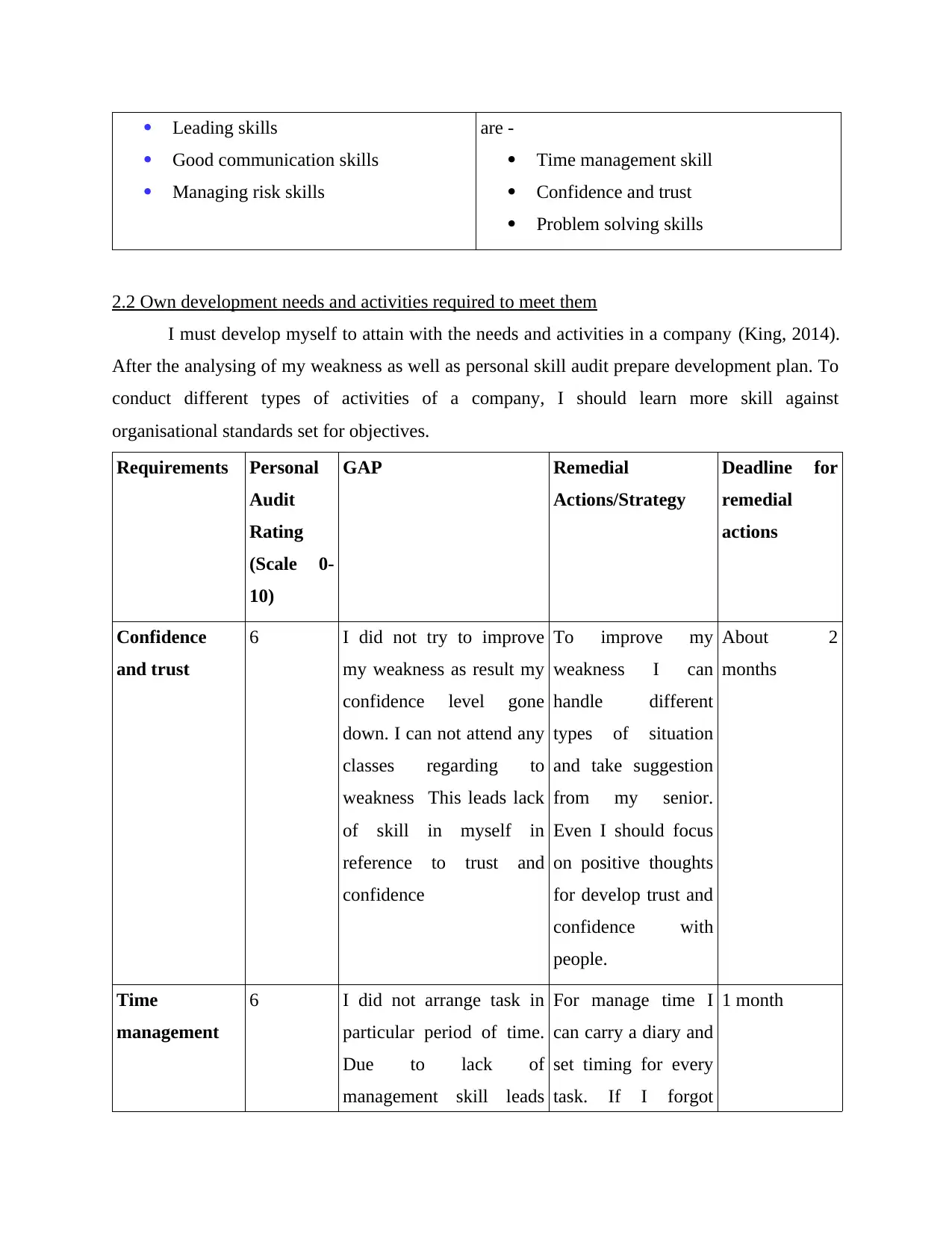
Leading skills
Good communication skills
Managing risk skills
are -
Time management skill
Confidence and trust
Problem solving skills
2.2 Own development needs and activities required to meet them
I must develop myself to attain with the needs and activities in a company (King, 2014).
After the analysing of my weakness as well as personal skill audit prepare development plan. To
conduct different types of activities of a company, I should learn more skill against
organisational standards set for objectives.
Requirements Personal
Audit
Rating
(Scale 0-
10)
GAP Remedial
Actions/Strategy
Deadline for
remedial
actions
Confidence
and trust
6 I did not try to improve
my weakness as result my
confidence level gone
down. I can not attend any
classes regarding to
weakness This leads lack
of skill in myself in
reference to trust and
confidence
To improve my
weakness I can
handle different
types of situation
and take suggestion
from my senior.
Even I should focus
on positive thoughts
for develop trust and
confidence with
people.
About 2
months
Time
management
6 I did not arrange task in
particular period of time.
Due to lack of
management skill leads
For manage time I
can carry a diary and
set timing for every
task. If I forgot
1 month
Good communication skills
Managing risk skills
are -
Time management skill
Confidence and trust
Problem solving skills
2.2 Own development needs and activities required to meet them
I must develop myself to attain with the needs and activities in a company (King, 2014).
After the analysing of my weakness as well as personal skill audit prepare development plan. To
conduct different types of activities of a company, I should learn more skill against
organisational standards set for objectives.
Requirements Personal
Audit
Rating
(Scale 0-
10)
GAP Remedial
Actions/Strategy
Deadline for
remedial
actions
Confidence
and trust
6 I did not try to improve
my weakness as result my
confidence level gone
down. I can not attend any
classes regarding to
weakness This leads lack
of skill in myself in
reference to trust and
confidence
To improve my
weakness I can
handle different
types of situation
and take suggestion
from my senior.
Even I should focus
on positive thoughts
for develop trust and
confidence with
people.
About 2
months
Time
management
6 I did not arrange task in
particular period of time.
Due to lack of
management skill leads
For manage time I
can carry a diary and
set timing for every
task. If I forgot
1 month
⊘ This is a preview!⊘
Do you want full access?
Subscribe today to unlock all pages.

Trusted by 1+ million students worldwide
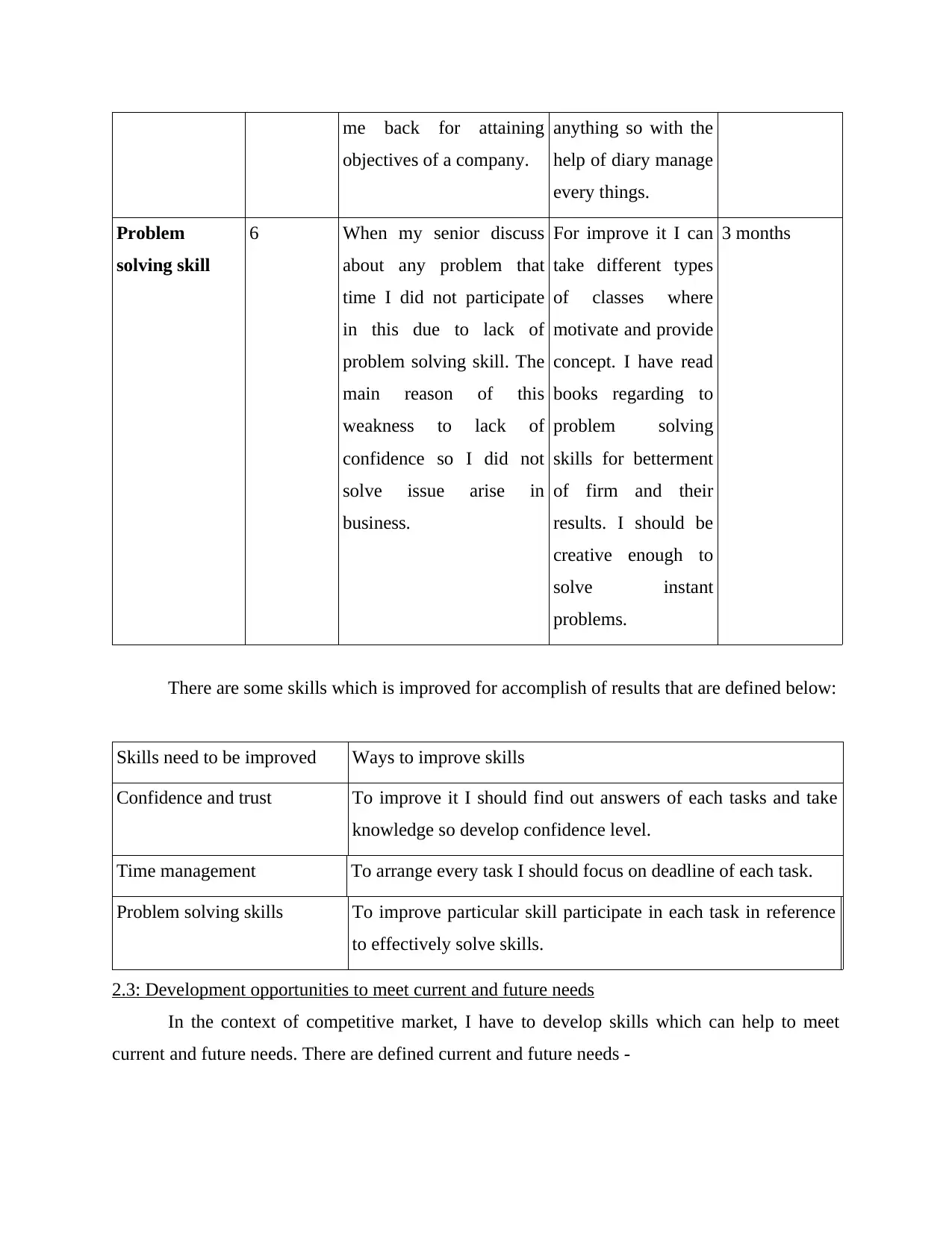
me back for attaining
objectives of a company.
anything so with the
help of diary manage
every things.
Problem
solving skill
6 When my senior discuss
about any problem that
time I did not participate
in this due to lack of
problem solving skill. The
main reason of this
weakness to lack of
confidence so I did not
solve issue arise in
business.
For improve it I can
take different types
of classes where
motivate and provide
concept. I have read
books regarding to
problem solving
skills for betterment
of firm and their
results. I should be
creative enough to
solve instant
problems.
3 months
There are some skills which is improved for accomplish of results that are defined below:
Skills need to be improved Ways to improve skills
Confidence and trust To improve it I should find out answers of each tasks and take
knowledge so develop confidence level.
Time management To arrange every task I should focus on deadline of each task.
Problem solving skills To improve particular skill participate in each task in reference
to effectively solve skills.
2.3: Development opportunities to meet current and future needs
In the context of competitive market, I have to develop skills which can help to meet
current and future needs. There are defined current and future needs -
objectives of a company.
anything so with the
help of diary manage
every things.
Problem
solving skill
6 When my senior discuss
about any problem that
time I did not participate
in this due to lack of
problem solving skill. The
main reason of this
weakness to lack of
confidence so I did not
solve issue arise in
business.
For improve it I can
take different types
of classes where
motivate and provide
concept. I have read
books regarding to
problem solving
skills for betterment
of firm and their
results. I should be
creative enough to
solve instant
problems.
3 months
There are some skills which is improved for accomplish of results that are defined below:
Skills need to be improved Ways to improve skills
Confidence and trust To improve it I should find out answers of each tasks and take
knowledge so develop confidence level.
Time management To arrange every task I should focus on deadline of each task.
Problem solving skills To improve particular skill participate in each task in reference
to effectively solve skills.
2.3: Development opportunities to meet current and future needs
In the context of competitive market, I have to develop skills which can help to meet
current and future needs. There are defined current and future needs -
Paraphrase This Document
Need a fresh take? Get an instant paraphrase of this document with our AI Paraphraser
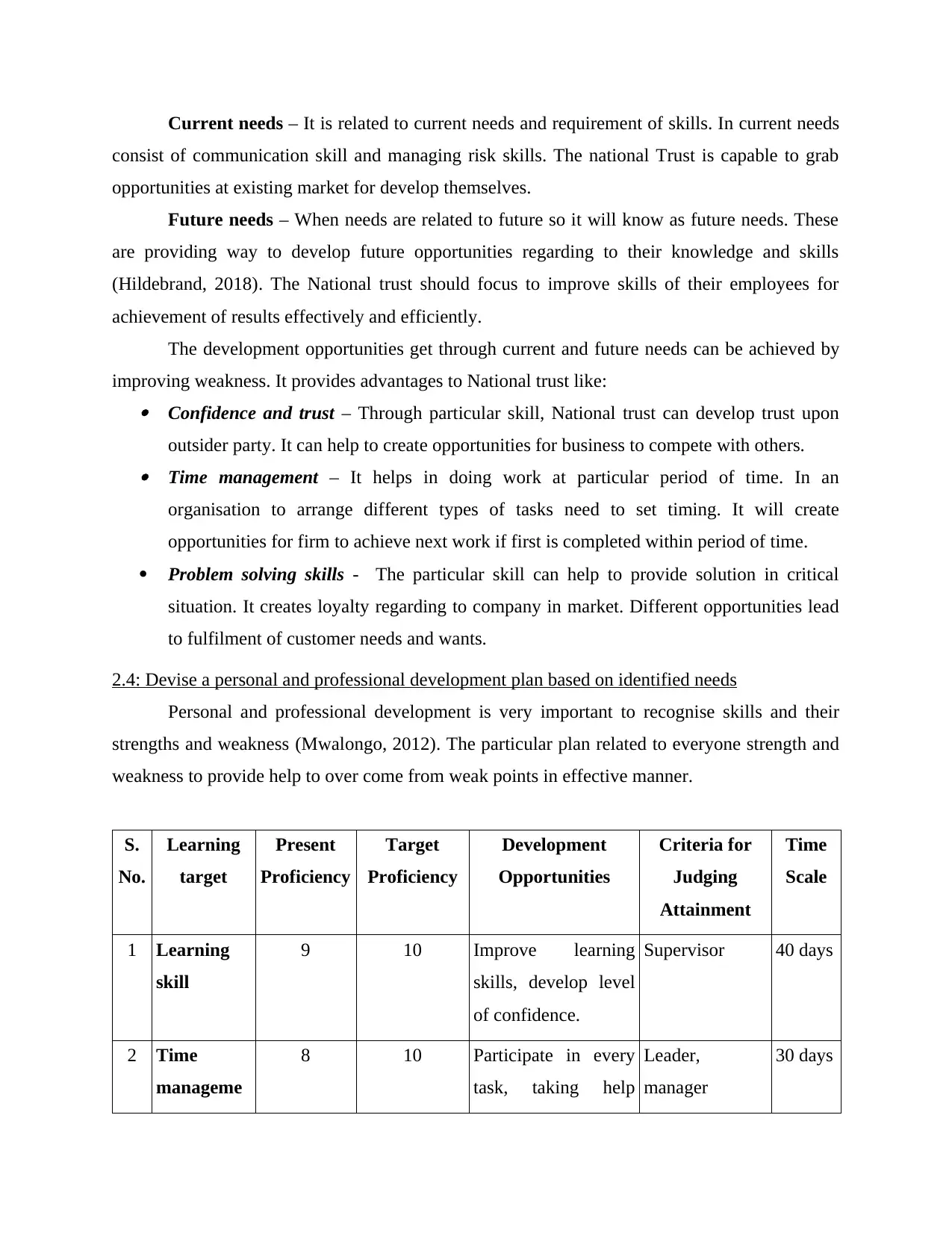
Current needs – It is related to current needs and requirement of skills. In current needs
consist of communication skill and managing risk skills. The national Trust is capable to grab
opportunities at existing market for develop themselves.
Future needs – When needs are related to future so it will know as future needs. These
are providing way to develop future opportunities regarding to their knowledge and skills
(Hildebrand, 2018). The National trust should focus to improve skills of their employees for
achievement of results effectively and efficiently.
The development opportunities get through current and future needs can be achieved by
improving weakness. It provides advantages to National trust like: Confidence and trust – Through particular skill, National trust can develop trust upon
outsider party. It can help to create opportunities for business to compete with others. Time management – It helps in doing work at particular period of time. In an
organisation to arrange different types of tasks need to set timing. It will create
opportunities for firm to achieve next work if first is completed within period of time.
Problem solving skills - The particular skill can help to provide solution in critical
situation. It creates loyalty regarding to company in market. Different opportunities lead
to fulfilment of customer needs and wants.
2.4: Devise a personal and professional development plan based on identified needs
Personal and professional development is very important to recognise skills and their
strengths and weakness (Mwalongo, 2012). The particular plan related to everyone strength and
weakness to provide help to over come from weak points in effective manner.
S.
No.
Learning
target
Present
Proficiency
Target
Proficiency
Development
Opportunities
Criteria for
Judging
Attainment
Time
Scale
1 Learning
skill
9 10 Improve learning
skills, develop level
of confidence.
Supervisor 40 days
2 Time
manageme
8 10 Participate in every
task, taking help
Leader,
manager
30 days
consist of communication skill and managing risk skills. The national Trust is capable to grab
opportunities at existing market for develop themselves.
Future needs – When needs are related to future so it will know as future needs. These
are providing way to develop future opportunities regarding to their knowledge and skills
(Hildebrand, 2018). The National trust should focus to improve skills of their employees for
achievement of results effectively and efficiently.
The development opportunities get through current and future needs can be achieved by
improving weakness. It provides advantages to National trust like: Confidence and trust – Through particular skill, National trust can develop trust upon
outsider party. It can help to create opportunities for business to compete with others. Time management – It helps in doing work at particular period of time. In an
organisation to arrange different types of tasks need to set timing. It will create
opportunities for firm to achieve next work if first is completed within period of time.
Problem solving skills - The particular skill can help to provide solution in critical
situation. It creates loyalty regarding to company in market. Different opportunities lead
to fulfilment of customer needs and wants.
2.4: Devise a personal and professional development plan based on identified needs
Personal and professional development is very important to recognise skills and their
strengths and weakness (Mwalongo, 2012). The particular plan related to everyone strength and
weakness to provide help to over come from weak points in effective manner.
S.
No.
Learning
target
Present
Proficiency
Target
Proficiency
Development
Opportunities
Criteria for
Judging
Attainment
Time
Scale
1 Learning
skill
9 10 Improve learning
skills, develop level
of confidence.
Supervisor 40 days
2 Time
manageme
8 10 Participate in every
task, taking help
Leader,
manager
30 days
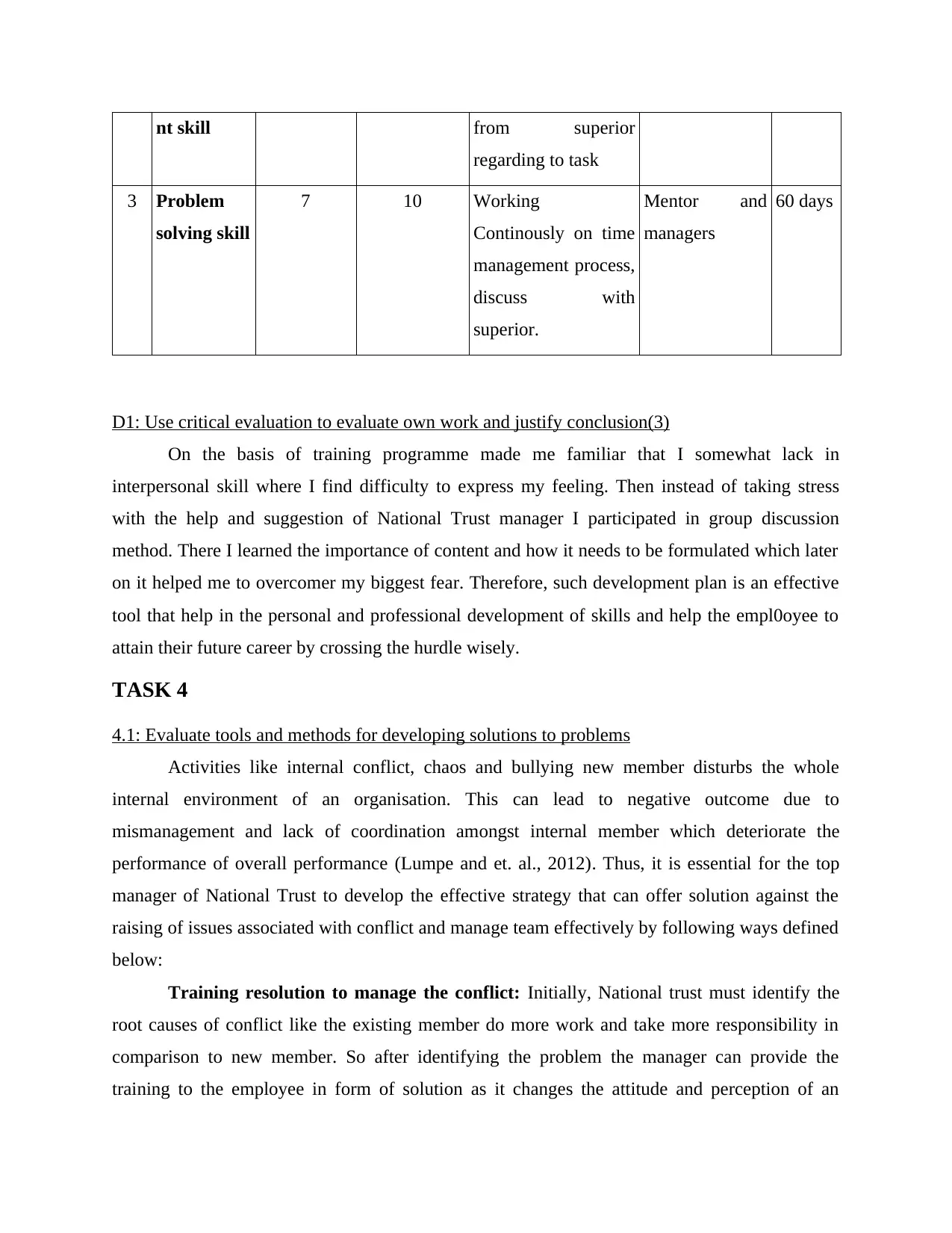
nt skill from superior
regarding to task
3 Problem
solving skill
7 10 Working
Continously on time
management process,
discuss with
superior.
Mentor and
managers
60 days
D1: Use critical evaluation to evaluate own work and justify conclusion(3)
On the basis of training programme made me familiar that I somewhat lack in
interpersonal skill where I find difficulty to express my feeling. Then instead of taking stress
with the help and suggestion of National Trust manager I participated in group discussion
method. There I learned the importance of content and how it needs to be formulated which later
on it helped me to overcomer my biggest fear. Therefore, such development plan is an effective
tool that help in the personal and professional development of skills and help the empl0oyee to
attain their future career by crossing the hurdle wisely.
TASK 4
4.1: Evaluate tools and methods for developing solutions to problems
Activities like internal conflict, chaos and bullying new member disturbs the whole
internal environment of an organisation. This can lead to negative outcome due to
mismanagement and lack of coordination amongst internal member which deteriorate the
performance of overall performance (Lumpe and et. al., 2012). Thus, it is essential for the top
manager of National Trust to develop the effective strategy that can offer solution against the
raising of issues associated with conflict and manage team effectively by following ways defined
below:
Training resolution to manage the conflict: Initially, National trust must identify the
root causes of conflict like the existing member do more work and take more responsibility in
comparison to new member. So after identifying the problem the manager can provide the
training to the employee in form of solution as it changes the attitude and perception of an
regarding to task
3 Problem
solving skill
7 10 Working
Continously on time
management process,
discuss with
superior.
Mentor and
managers
60 days
D1: Use critical evaluation to evaluate own work and justify conclusion(3)
On the basis of training programme made me familiar that I somewhat lack in
interpersonal skill where I find difficulty to express my feeling. Then instead of taking stress
with the help and suggestion of National Trust manager I participated in group discussion
method. There I learned the importance of content and how it needs to be formulated which later
on it helped me to overcomer my biggest fear. Therefore, such development plan is an effective
tool that help in the personal and professional development of skills and help the empl0oyee to
attain their future career by crossing the hurdle wisely.
TASK 4
4.1: Evaluate tools and methods for developing solutions to problems
Activities like internal conflict, chaos and bullying new member disturbs the whole
internal environment of an organisation. This can lead to negative outcome due to
mismanagement and lack of coordination amongst internal member which deteriorate the
performance of overall performance (Lumpe and et. al., 2012). Thus, it is essential for the top
manager of National Trust to develop the effective strategy that can offer solution against the
raising of issues associated with conflict and manage team effectively by following ways defined
below:
Training resolution to manage the conflict: Initially, National trust must identify the
root causes of conflict like the existing member do more work and take more responsibility in
comparison to new member. So after identifying the problem the manager can provide the
training to the employee in form of solution as it changes the attitude and perception of an
⊘ This is a preview!⊘
Do you want full access?
Subscribe today to unlock all pages.

Trusted by 1+ million students worldwide
1 out of 18
Related Documents
Your All-in-One AI-Powered Toolkit for Academic Success.
+13062052269
info@desklib.com
Available 24*7 on WhatsApp / Email
![[object Object]](/_next/static/media/star-bottom.7253800d.svg)
Unlock your academic potential
Copyright © 2020–2026 A2Z Services. All Rights Reserved. Developed and managed by ZUCOL.


